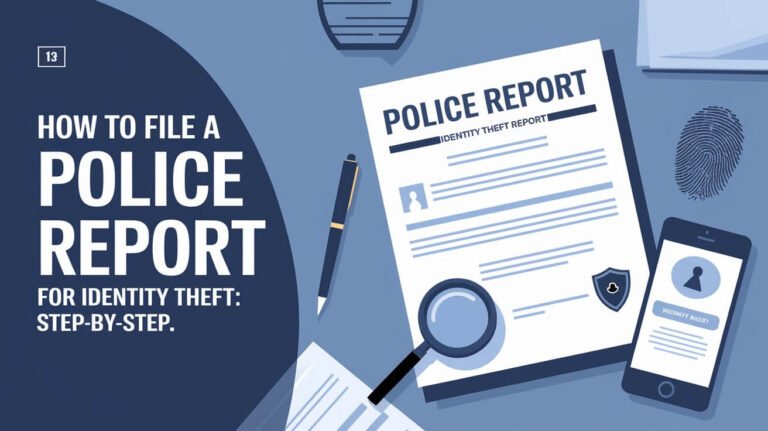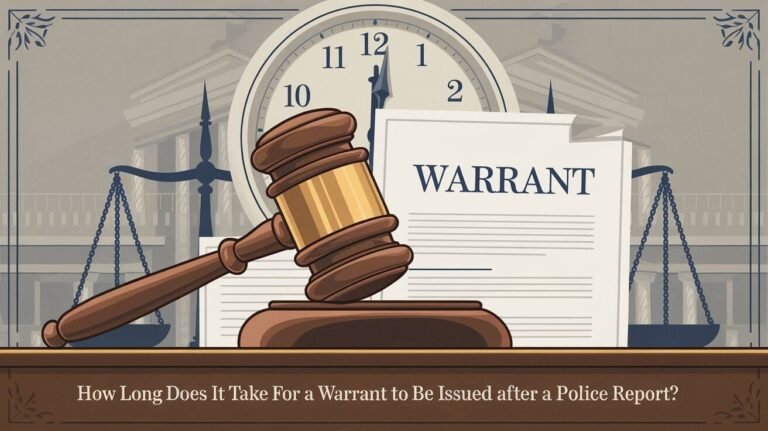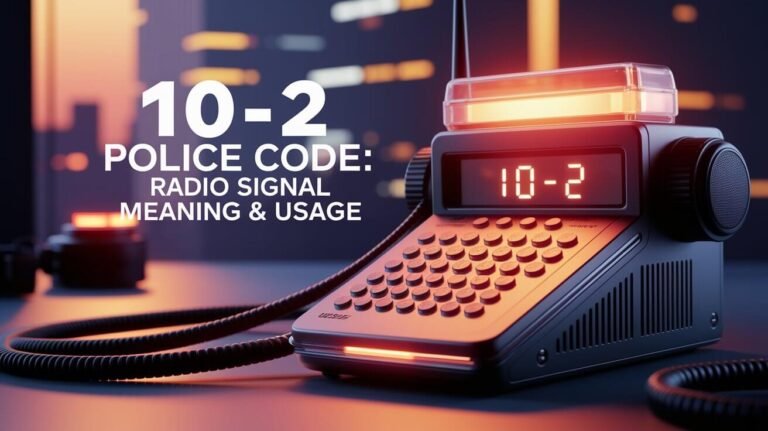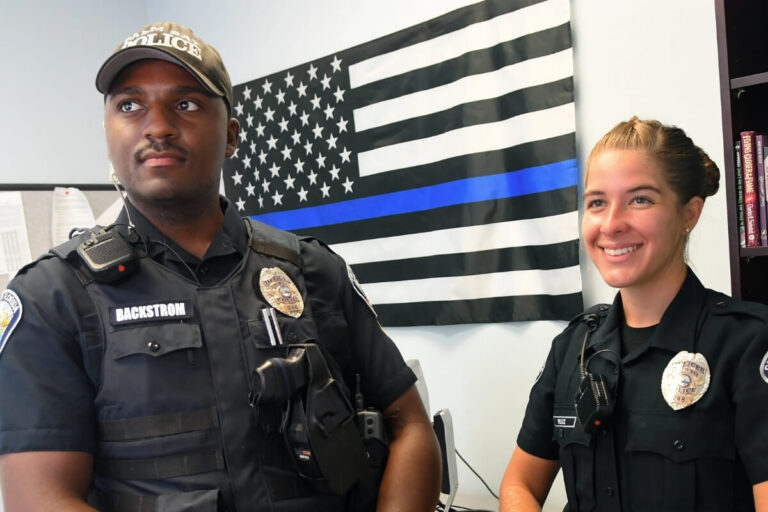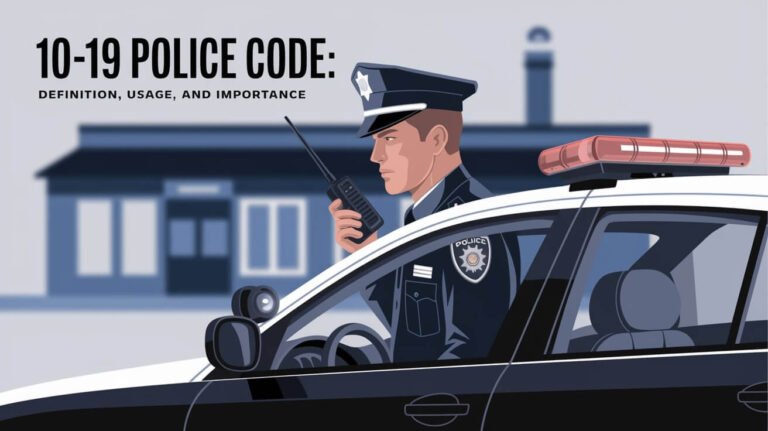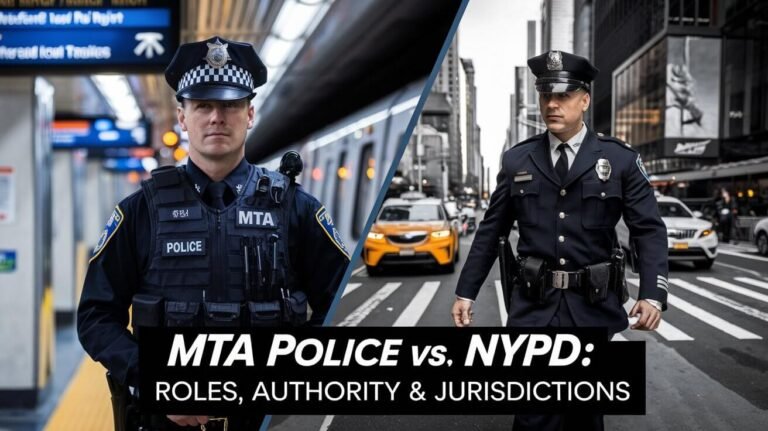What Do Captain Of Police Do: Roles and Responsibilities
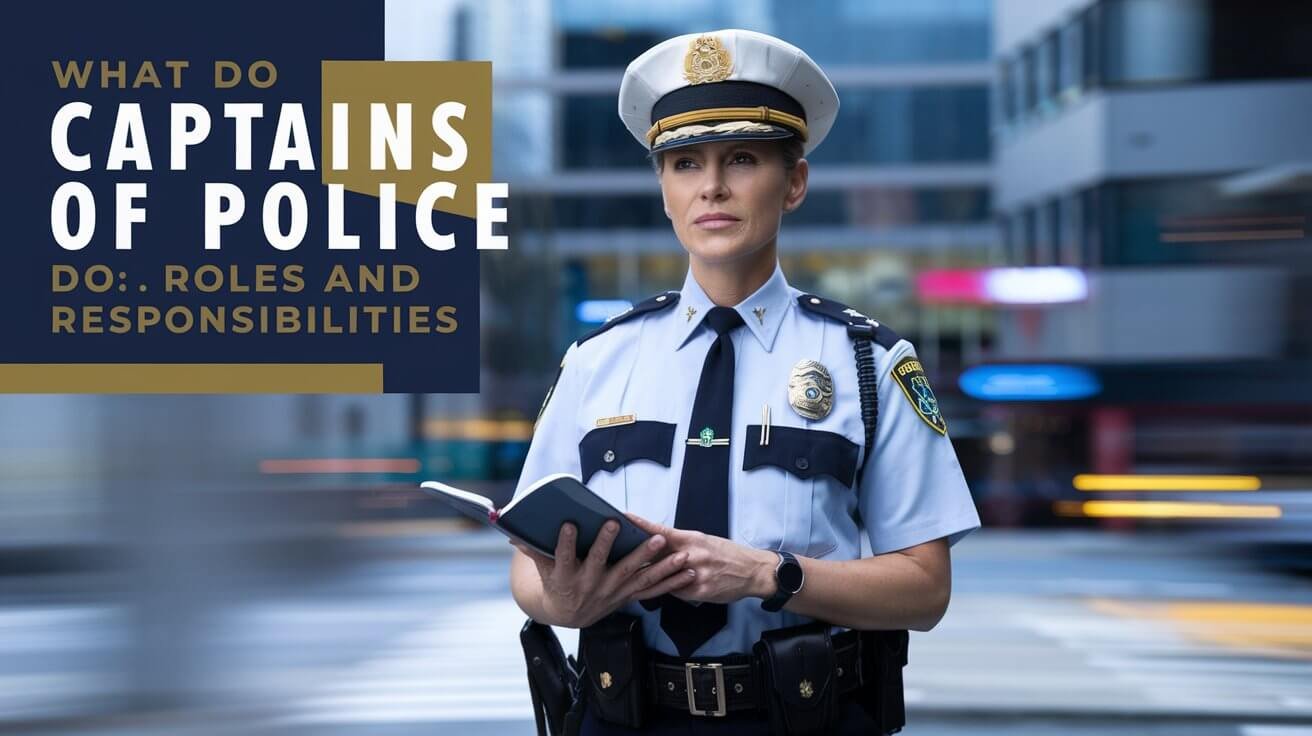
Police captains are key in keeping communities safe. They work with about 473,000 full-time officers in local police departments. Their job is to make sure everything runs smoothly in law enforcement.
They oversee a precinct, district, or police department. This makes them very important for public safety. Their role is to guide officers and manage resources well.
The median salary for a police captain is $87,000. This shows how valuable their work is. Police captains do many things, like training officers and managing budgets. They also lead investigations, needing strong leadership skills.
Police Captain Position Overview
The role of a police captain is key in managing a police department. They need to understand the department’s structure and hierarchy well. The captain’s duties can change a lot, depending on the department’s size and complexity.
In big departments, captains lead specialized teams like patrol or investigations. In smaller ones, they handle more general tasks. This shows how important their role is in keeping the department running smoothly.
The size of the department affects a captain’s authority. Bigger departments have more specialized teams, each needing a captain. The salary of a police captain also changes based on the department’s size, location, and the captain’s experience.
Command Structure Position
A police captain reports to a higher officer, like a deputy chief. They oversee lieutenants and sergeants. Their role in the department’s hierarchy is vital, balancing their division’s needs with the department’s goals.
Departmental Hierarchy
The department’s hierarchy is key to management. It outlines who reports to whom and how communication flows. A captain must navigate this well to work with others and meet department goals.
Authority Scope
A captain’s authority is also critical. It shows what decisions they can make and their responsibilities. They must use their judgment wisely, even in tough situations, to keep their division and the department running well.
| Department Size | Number of Captains | Specialized Divisions |
|---|---|---|
| Small | 1-2 | Patrol, Investigations |
| Medium | 3-5 | Patrol, Investigations, Administrative Services |
| Large | 6-10 | Air Support, Commercial Crimes, Robbery-Homicide, and more |
Daily Operations Management
Police captains are key in managing their departments daily. They oversee many aspects of police work. Their tasks include supervising officers, managing resources, and following policies and laws. Good management is vital for keeping the public safe and trusting in law enforcement.
A police captain’s day is filled with tasks like directing officers and managing resources. They also oversee investigations. It’s important for them to follow department policies and legal rules. They need to keep up with the latest in law enforcement.
Some important parts of a police captain’s job include:
- Supervising and directing subordinate officers
- Managing department resources, such as vehicles, personal computers, and telecommunications devices
- Overseeing investigations and ensuring that they are conducted in accordance with department policies and legal requirements
- Ensuring compliance with policies and regulations, including those related to police administration, organization, and operation
To do their job well, police captains need certain skills. They should have a bachelor’s degree in criminal justice or public administration. They also need at least six years of law enforcement experience. They must know a lot about police work and stay updated with the latest methods and tools.
Strategic Planning Responsibilities
Police captains are key in strategic planning. They manage budgets and set goals to measure success. This planning is vital for reducing crime and bettering community ties.
The Corinth Police Department has a 2024 Strategic Plan. It was updated in January 2024. The plan outlines the department’s mission and vision. It aims to protect communities and work with them for safer areas.
Key Aspects of Strategic Planning
- Resource allocation: Police captains must allocate resources effectively to support strategic objectives.
- Budget management: Police captains are responsible for managing budgets and ensuring that resources are allocated efficiently.
- Performance metrics development: Police captains must develop performance metrics to evaluate department effectiveness and make data-driven decisions.
Focusing on strategic planning, police captains can prepare their departments for community challenges. Good budget management is key to reaching goals and improving relations with the community.
| Departmental Goal | Strategic Objective | Performance Metric |
|---|---|---|
| Safety | Reduce crime rates by 10% | Crime rate reduction percentage |
| Exceptional Customer Service | Improve community satisfaction ratings by 15% | Community satisfaction rating percentage |
| Doing the Right Thing | Increase transparency and accountability by 20% | Transparency and accountability rating percentage |
Staff Development Functions
Police captains are key in developing their staff. They make sure police officers get the training they need to do well. This includes hiring, training, and helping officers grow professionally.
Keeping up with new techniques and technologies is vital. Captains guide and check how officers are doing. They offer feedback to help officers reach their best.
Staff development is important. It helps officers stay skilled and ready to serve. Captains play a big role in this.
Some key parts of staff development are:
- Recruitment and hiring of new officers
- Providing training and development opportunities
- Mentoring and evaluating officer performance
- Identifying areas for improvement and providing feedback
Focusing on staff development, captains create a positive work place. This leads to happier officers, less turnover, and better safety for everyone. So, captains are essential for law enforcement success.
What Do Captain Of Police Do Within Investigations
Police captains are key in leading major investigations. They create strategies and work with other agencies to solve cases. Their knowledge is vital in managing and solving crimes.
They lead teams and make decisions to focus efforts on justice. This ensures that criminals are brought to justice.
Working together with other agencies is important. Police captains share resources and information. This helps in gathering evidence and tracking suspects.
Working together, they make sure investigations are complete. This way, justice is served.
Major Case Oversight
Police captains oversee major investigations. They review case files and assign tasks. They also check on progress and make sure procedures are followed.
They handle evidence properly and store it correctly. This is important for the investigation.
Investigation Strategy Development
Creating effective strategies is key to solving crimes. Police captains analyze evidence and look for patterns. They also think about what suspects might do next.
They adjust their plans as new information comes in. This keeps the investigation on track and productive.
Inter-agency Coordination
Working with other agencies is essential. Police captains share resources and expertise. This helps in gathering evidence and building strong cases.
By working together, they ensure investigations are thorough. This leads to justice being served.
| Investigation Phase | Police Captain’s Role |
|---|---|
| Initial Response | Oversee initial response, assign tasks to team members |
| Evidence Collection | Ensure proper evidence handling and storage |
| Investigation Strategy Development | Analyze evidence, identify patterns, anticipate suspect actions |
| Inter-agency Coordination | Collaborate with other agencies, share resources and expertise |
Community Relations Management
Building trust between law enforcement and the community is key for good community policing. Police captains are important in this effort. They work on public safety programs, manage media, and reach out to the community.
The Police-Community Relations Awards have been running for 44 years. In 2022, Captain Iyevbele won an award for his community work. He’s involved in programs like Building Bridges Through Basketball and oversees youth camps.
Public Safety Programs
Public safety programs are a big part of community policing. They teach the community about safety, like crime prevention and how to respond in emergencies. The Orange County Sheriff’s Office offers services like security assessments and educational programs on safety.
Community Engagement Initiatives
Community engagement is key to building trust between law enforcement and the community. Programs like Explorer Post 2061 and Citizens On Patrol help. They offer training and let volunteers help patrol neighborhoods.
| Program | Description |
|---|---|
| Police-Community Relations Awards | Annual awards ceremony recognizing police officers for their community service |
| Building Bridges Through Basketball | Community program promoting youth development and relationships between law enforcement and the community |
| Explorer Post 2061 | Training program for individuals aged 14-21 in various law enforcement aspects |
Policy Implementation Role
Police captains are key in making sure department policies are followed. They make sure all actions are legal and follow the rules. They also update policies as needed to keep up with changes.
To do this job well, captains need to know a lot about law enforcement policies. They must also be great at communicating. This helps make sure all officers know and follow the rules. Some important tasks for captains include:
- Creating and enforcing new policies and procedures
- Checking and updating policies regularly
- Teaching officers about policy implementation
- Watching to see if policies are being followed
Following policies well, captains help keep the department’s reputation strong. This is important for building trust with the community. It helps create a safe and positive place for everyone. Police captains play a big role in making sure policies are followed fairly and consistently.
Emergency Response Coordination
Police captains are key in managing emergency responses. They handle crises and plan for disasters. Their job is to save lives and reduce damage.
They oversee emergency plans and make sure the department is ready for disasters. This is vital for a quick and effective response.
In a disaster, police captains lead special operations. They work with other agencies for a unified effort. This needs strong leadership and quick decision-making.
With a solid emergency plan, police departments can lower injury and damage risks. They also help communities in need.
Key Components of Emergency Response
- Developing and implementing emergency operation plans
- Coordinating with other agencies, such as fire and emergency medical services
- Commanding special operations, including search and rescue missions
- Providing critical support to affected communities, including food, shelter, and medical care
Police captains manage emergency responses well. This helps reduce disaster impacts and saves lives. They use crisis management skills in tough situations.
Through their leadership, police captains keep communities safe. They are essential in emergency situations.
| Emergency Response Component | Description |
|---|---|
| Emergency Operation Plan | A plan that outlines the department’s response to emergencies, including natural disasters and terrorist attacks |
| Special Operations Command | A team that is trained to respond to high-risk situations, including search and rescue missions and hostage situations |
| Crisis Management | The process of managing and responding to emergencies, including assessing the situation, developing a response plan, and implementing the plan |
Administrative Oversight Tasks
Police captains are key in the administrative side of law enforcement. They handle tasks that keep the department running smoothly. This includes managing people, handling budgets, and following rules, all vital for good police work.
They oversee staff, picking or suggesting team members, and checking their work. They also deal with misconduct, keeping the department professional and honest.
Some important tasks they do are:
- Working on budgets with the Chief of Police
- Using data to plan Field Operations strategies
- Managing Investigations Division, including Criminal Investigations Sections
- Creating plans to solve complaints and investigations quickly
Managing these tasks well, police captains help their department work efficiently. This ensures top service to the community, a key part of law enforcement and police work.
| Task | Description |
|---|---|
| Personnel Management | Supervising assigned staff, including selecting or recommending staff, assigning and evaluating work, and counseling employees |
| Budget Administration | Developing budget strategies in conjunction with the Chief of Police |
| Regulatory Compliance | Ensuring compliance with regulations and maintaining high standards of professionalism and integrity |
Professional Standards Enforcement
Police captains are key in keeping their departments’ standards high. They make sure officers follow strict ethics and integrity rules. This includes handling internal affairs, disciplinary actions, and checking if everyone is following the rules.
Keeping professional standards high is vital for law enforcement. It helps build trust between police and the public. Captains must create a culture of honesty in their departments. They encourage officers to act with the utmost integrity and ethics.
Internal Affairs Liaison
Police captains work closely with internal affairs teams. They help make sure investigations into officer misconduct are fair and complete. This means working with investigators, talking to witnesses, and checking reports.
Disciplinary Procedures
Captains also handle disciplinary actions. They make sure officers who break the rules face consequences. This could mean suspending or firing them, depending on the offense.
Compliance Monitoring
Another part of their job is checking if everyone is following the rules. They do audits and reviews to find areas for improvement. They also provide training and guidance to officers.
Some important parts of enforcing standards include:
- Investigating complaints of officer misconduct
- Conducting internal affairs investigations
- Overseeing disciplinary procedures
- Monitoring compliance with department policies and procedures
Enforcing these standards, police captains help keep the public’s trust in law enforcement. They ensure officers are held to the highest standards of conduct and ethics.
Technology Integration Leadership
Police captains are key in bringing new tech into their departments. They adopt and use new tools like computer-aided dispatch systems. They also train officers to use these tools well.
The main goal is to make operations better, keep officers safe, and help solve crimes.
Law enforcement tech brings many benefits, such as:
- Improved data sharing and analysis
- Enhanced officer safety with body-worn cameras and in-car videos
- Increased efficiency and cost savings through automation
- Better decision-making with data analytics and AI tools
Police tech companies keep coming up with new solutions. These include cloud storage, platform integration, and AI tools. By using these, police can serve the community better.
Effective tech integration needs strong leadership. It also requires a commitment to keep up with new tech.
| Technology | Benefits |
|---|---|
| Cloud-based storage | Cost-effective, enhanced security, robust computing capabilities |
| Platform integration | Seamless operations, improved data sharing, increased efficiency |
| AI-based analytic tools | Quick data analysis, improved decision-making, enhanced investigative efforts |
Conclusion
The police captain role is key to good law enforcement. These leaders manage daily tasks, plan strategies, and connect with the community. They keep everyone safe and build trust.
Police captains have a lot of training and leadership skills. They know how their departments work well. This helps shape the culture and success of their teams.
They handle crisis situations and enforce policies. Police captains are dedicated and manage well. They earn respect from their colleagues and the community.
Police captains are the heart of law enforcement. They stand for service, accountability, and new ideas. Their work helps make communities stronger and safer.
FAQs
What is the role of a police captain?
A police captain is a key officer in charge of a precinct or department. They make sure the community is safe and order is kept.
What is the command structure and departmental hierarchy of a police department?
We’ll look at how police departments are organized. This includes the role of a captain in leading the team.
What are the daily operations management tasks of a police captain?
Captains manage officers, resources, and investigations. They follow department rules and laws closely.
What are the strategic planning responsibilities of a police captain?
Captains plan how to use resources and manage budgets. They aim to lower crime and improve community ties.
What are the staff development functions of a police captain?
Captains help train and grow officers. They keep them updated with new methods and tools.
What is the role of a police captain within investigations?
Captains lead big cases and plan strategies. They work with other agencies to solve crimes and catch culprits.
What are the community relations management responsibilities of a police captain?
Captains work on safety programs and media relations. They aim to build trust and cooperation with the community.
What is the role of a police captain in implementing and enforcing department policies and procedures?
Captains make sure officers follow rules. They also update policies to keep the department fair and trusted.
What are the emergency response coordination responsibilities of a police captain?
Captains handle crises and plan for disasters. They lead special operations to save lives and reduce damage.
What are the administrative oversight tasks of a police captain?
Captains manage people, budgets, and rules. They help the department run smoothly and efficiently.
What is the role of a police captain in enforcing professional standards within the department?
Captains work with internal affairs and handle discipline. They keep the department’s standards high and earn public trust.
What are the technology integration leadership responsibilities of a police captain?
Captains lead in adopting new tech. They train officers to use these tools to improve their work.

